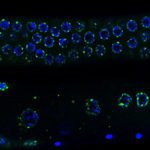Link to Pubmed [PMID] – 28457744
Mol. Cell 2017 May;66(3):411-419.e4
Most piRNAs in the Drosophila female germline are transcribed from heterochromatic regions called dual-strand piRNA clusters. Histone 3 lysine 9 trimethylation (H3K9me3) is required for licensing piRNA production by these clusters. However, it is unclear when and how they acquire this permissive heterochromatic state. Here, we show that transient Piwi depletion in Drosophila embryos results in H3K9me3 decrease at piRNA clusters in ovaries. This is accompanied by impaired biogenesis of ovarian piRNAs, accumulation of transposable element transcripts, and female sterility. Conversely, Piwi depletion at later developmental stages does not disturb piRNA cluster licensing. These results indicate that the identity of piRNA clusters is epigenetically acquired in a Piwi-dependent manner during embryonic development, which is reminiscent of the widespread genome reprogramming occurring during early mammalian zygotic development.

